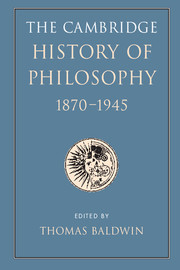Book contents
- Frontmatter
- Contents
- List of contributors
- Introduction
- I 1870–1914
- II 1914–1945
- 8 Logic and philosophy: the analytic programme
- 9 The diversity of philosophy
- 32 The continuing idealist tradition
- 33 Transformations in speculative philosophy
- 34 Realism, naturalism, and pragmatism
- 35 French Catholic philosophy
- 36 Spanish philosophy
- 37 The phenomenological movement
- 38 Heidegger
- 39 Latin american philosophy
- 40 Japanese philosophy
- 10 Knowledge, language, and the end of metaphysics
- 11 Philosophy and the exact sciences
- 12 Mind and its place in nature
- 13 Philosophy and social science
- 14 Ethics, religion, and the arts
- 15 Law and politics
- Biobibliographical appendix
- Bibliography
- INDEX
- References
40 - Japanese philosophy
from 9 - The diversity of philosophy
Published online by Cambridge University Press: 28 March 2008
- Frontmatter
- Contents
- List of contributors
- Introduction
- I 1870–1914
- II 1914–1945
- 8 Logic and philosophy: the analytic programme
- 9 The diversity of philosophy
- 32 The continuing idealist tradition
- 33 Transformations in speculative philosophy
- 34 Realism, naturalism, and pragmatism
- 35 French Catholic philosophy
- 36 Spanish philosophy
- 37 The phenomenological movement
- 38 Heidegger
- 39 Latin american philosophy
- 40 Japanese philosophy
- 10 Knowledge, language, and the end of metaphysics
- 11 Philosophy and the exact sciences
- 12 Mind and its place in nature
- 13 Philosophy and social science
- 14 Ethics, religion, and the arts
- 15 Law and politics
- Biobibliographical appendix
- Bibliography
- INDEX
- References
Summary
The year 1868 marks the formal beginning of Japan’s modern period and by the late nineteenth century we find distinctively modern modes of philosophising. In the Japanese context ‘modern philosophy’ suggests significant knowledge of, and response to, the Western philosophical tradition. In 1854 US gunboats ended two and a half centuries of self-imposed Japanese national isolation. Aware that they had fallen behind the West technologically, the Japanese overthrew the shogun in 1868 and reinstated imperial rule with hopes of rapid modernisation. Real power, however, lay in the hands of an elite class of intellectuals, many of whom at a formative age were sent to the West to study any number of subjects, including philosophy. Upon returning home they immediately applied their knowledge to restructuring Japanese society and to translating or analysing a wide variety of Western intellectual works.
The Japanese philosophers' reading of the Western situation was that it was mired in a series of apparently irresolvable polarities: Kant’s or Hegel’s idealism versus Comte’s positivism or Locke’s empiricism; deontological versus utilitarian ethics; the imperial system versus democracy; individualism versus collectivism; Marxism versus capitalism. Furthermore, there was the new Japanese conflict between Western and traditional Asian values. There were two common approaches to this polarised situation: either to argue for one pole over the other or to seek for a dialectical reconciliation between the opposites. Increasingly, especially from around the second decade of the twentieth century, the reconciliationists tended to dominate.
- Type
- Chapter
- Information
- The Cambridge History of Philosophy 1870–1945 , pp. 513 - 518Publisher: Cambridge University PressPrint publication year: 2003



